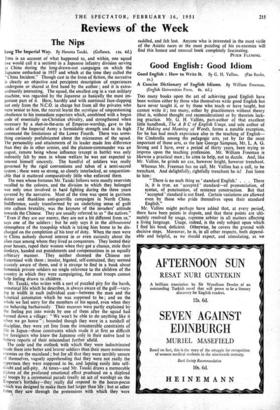Reviews of the Week
The Nips
Long The Imperial Way. By Hanama Tasaki. (Gofiance.. las. 6d.)
Tills is an account of what happened to, and within, one squad (we would call it a section) in a Japanese infantry division serving In China during the long-drawn-out campaigns on which the Japanese embarked in 1937 and which at the time they called the
"China Incident." Though cast in the form of fiction, the narrative is clearly an objective and percipient description of experiences
undergone or shared at first hand by the author ; and it is extra- ordinarily interesting. The squad, the smallest cog in a vast military machine, was regarded by the Japanese as basically the most im- portant part of it. Here, harshly and with continual face-slapping not only from the N.C.O. in charge but from all the privates who uere senior to him, the recruit learnt the mystique of unquestioning obedience to his immediate superiors which, combined with a bogus code of essentially un-Christian chivalry, and strengthened when necessary by a shot-in-the-arm of Emperor-worship, gave to the ranks of the Imperial Army a formidable strength and to its high command the limitations of the Lower Fourth. There was some- thing curiously prefabricated about the microcosm of the squad.
The personality and attainments of its leader made less difference than they do in other armies, and the platoon-commander was an august, remote being whose influence (except in battle) was only
indirectly felt by men in whose welfare he was not expected to interest himself sincerely. The handful of soldiers was really governed by the rigid conventions and tabus of a semi-sacred system ; these were so strong, so closely interlocked, so unquestion- able that it mattered comparatively little who enforced them.
The men whose fortunes Mr. Tasaki follows were mostly reservists recalled to the colours, and the division to which they belonged was only once involved in hard fighting during the three years covered by the narrative. Most of the time was spent in garrison duties and thankless anti-guerrilla campaigns in North China.
Indifference, easily transformed by an underlying sense of guilt into callous brutality, was the keynote of the invaders' attitude towards the Chinese. They are usually referred to as "the natives."
" Even if they are our enemy, they are not a bit different from us," says one of the soldiers ; but he only says it in the deboutonne atmosphere of the troopship which is taking him home to be dis- charged on the completion of his tour of duty. When the men were in China nobody showed interest in or even curiosity about the alien race among whom they lived as conquerors. They looted their poor houses, raped their women when they got a chance, stole their donkeys, handed out punishments and compensations in an equally arbitrary manner. They neither shunned the Chinese nor fraternised with them ; insular, bigoted, self-contained, they seemed scarcely aware of them, and it is strange to find in a book about homesick private soldiers no single reference to the children of the country in which they were campaigning, for most troops cannot help feeling drawn to children.
Mr. Tasaki, who writes with a sort of puzzled pity for the harsh, unnatural life which he describes, is always aware of the gulf—vary- ing in width in each individual case—between the man and the
fanatical automaton which he was supposed to be ; and on the ‘‘ hole we feel sorry for the members of his squad, even when they
are behaving barbarously. Their excesses were partly explained by the feeling put into words by one of them after the squad had burned down a village: "We won't be able to do anything like it
%hen we go home " ; bounded though they were in a nutshell of discipline, they were yet free from the innumerable constraints of life in Japan—those constraints which made it at first so difficult for foreigners who knew the Japanese only in their native land to believe reports of their misconduct further afield.
The code and the outlook with which they were indoctrinated made them into better and braver soldiers than their more numerous enemies on the mainland ; but for all that they were terribly unsure of themselves, vaguely apprehending that they were not really the s9permen they were supposed to be, and lapsing easily into self- doubt and self-pity. At times—and Mr. Tasaki draws a memorable Picture of the profound emotional effect produced on a shipload of troops by a ceremonial parade (really an act of worship) on the Emperor's birthday—they really did respond to the hocus-pocus 1.!hich was designed to make them feel larger than life ; but at other limes they saw through the pretensions with which they were
saddled, and felt lost. Anyone who is interested in the most virile of the Asiatic races or the most puzzling of his ex-enemies will find this honest and unusual book completely fascinating.
PETER FLEMING.


































 Previous page
Previous page